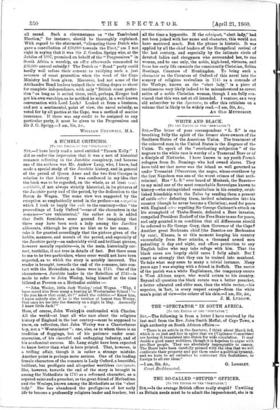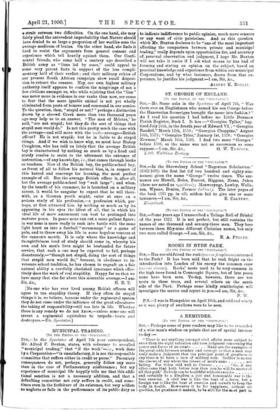THE SO - CALLED " STUPID " OFFICER.
[To THE EDITOR OF THE "SPECTATOR:] SIR,—Is the average British officer really stupid? Unwilling as Britain needs must be to admit the impeachment, she is in a strait oetween two difficulties. On the one hand, she may fairly plead the antecedent improbability that Nature should have denied to so large a proportion of her warlike sons the average modicum of brains. On the other hand, she finds it bard to resist the arguments from general consent and experience which tell heavily against them. Our Conti- nental friends, who some half a century ago described a British army as "lions led by asses," could appeal to some very patent facts in support of the less compli- mentary half of their verdict ; and their military critics of our present South African campaign show small disposi- tion to retract the censure. Nay, our own highest military authority itself appears to confirm the misgivings of not a few civilians amongst us, who while rejoicing that the "lion" was never more in evidence in our ranks than now, see cause to fear that the more ignoble animal is not yet wholly eliminated from posts of honour and command in oar armies To the question, then, "stupid or not?" perhaps a distinction drawn by a shrewd Greek more than two thousand years ago may help us to an answer. "The men of Miletus,' he said, "are not stupid; but they do the sort of things that stupid men would do." Is not this pretty mach the case with the average—and still more with the zendei.-average—British officer? He is not stupid; but he is liable to do stupid things. And if we wish to know why, we must hear Bishop Creighton, who has told us lately that the average British boy is characterised by nothing so much as by a fixed and sturdy resolve to resist to the uttermost the entrance of instruction,—of any knowledge, i e , that comes through books or teachers. Now of the British boy, the public-school boy, as freest of all to follow his natural bias, is, in respect of this hatred and contempt for learning, the most perfect example of all. But the average British officer is, after all, but the average public-school boy "writ large" ; and when, by the benefit of his crammer, he is launched on a military career, it would be sanguine to expect that he will there- with, as a German youth might, enter at once on a serious study of his profession,—a profession which, per- haps, at first attracted him by nothing so much as by its appearing in his eyes the idlest of all, that in which his ideal life of mere amusement can best be prolonged into maturer years. In peace acne can cut a more gallant figure; in war none is more ready to rush into battle with the same light heart as into a football " scrummage " or a game of polo, and to throw away his life in some hopeless venture at the cannon's mouth. It is only where the knowledge and thoughtfulness bred of study should come in, whereby his own and his men's lives might be husbanded for future service, that such a one may be expected to fail, perhaps disastrously,—" though not stupid, doing the sort of things that stupid men would do," because, in obedience to in- veterate school tradition, he has chosen to engraft on a fair natural ability a caref ally cherished ignorance which effec- tively does the work of real stupidity. Happy for us that we have many that rise far above this miserable average.—! am, [No one who has ever lived among British officers will agree to the stupidity theory. If they often do stupid things it is, we believe, because under the regimental system they do not come under the influence of the great educator— the taking of responsibility—till too late in life. Whether there is any remedy we do not know,—unless some one will invent a regimental equivalent to torpedo - boats and destroyers.—ED. Spectator.]



































 Previous page
Previous page